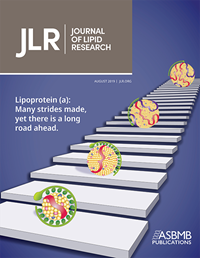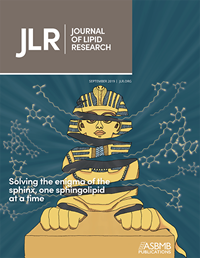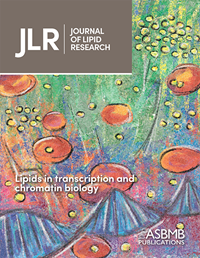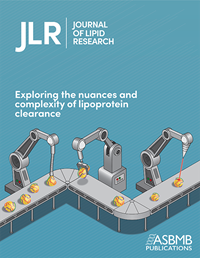JLR junior associate editors organize virtual issues
The junior associate editors of the Journal of Lipid Research have organized four virtual issues highlighting cutting-edge research published by the journal.

Lipoprotein (a): Many strides made, yet there is a long road ahead
In this virtual issue, the JLR highlights early-career researchers pushing our understanding of lipoprotein (a) pathophysiology forward. According to Gissette Reyes-Soffer of the Columbia University Irving Medical Center, a better grasp of lipoprotein (a) is necessary to improve risk evaluations and targeted therapies for cardiovascular disease and diabetes.
The cover art depicts the Lp(a) particle following the steps of a walking path, increasing in size as the road goes into infinity. Read the collection.

Solving the enigma of the sphinx, one sphingolipid at a time
Recent studies have advanced our understanding of sphingolipids and their biologic roles in health and disease. This virtual issue, organized by Rotonya Carr of the University of Pennsylvania Perelman School of Medicine, also highlights both established and new investigators in the field who undoubtedly are the future of sphingolipid research.
The cover art features the structures of several sphingolipids being freed as the Sphinx unravels. Read the collection.
Exploring the nuances and complexity of lipoprotein clearance
This virtual issue, assembled by Brandon Davies of the University of Iowa Carver College of Medicine, highlights studies that advance our understanding of lipoprotein clearance and illustrate the breadth and diversity of lipoprotein-clearance research.
The cover art depicts different mechanisms acting to clear and modify lipoproteins on an assembly line representing the circulation. Read the collection.

Lipids in transcription and chromatin biology
Ray Blind of the Vanderbilt University School of Medicine put together a virtual issue showcasing recent papers showing that lipids actively participate in epigenetic reprogramming, chromatin modifications and nucleosome structure, along with their more well-established roles in splicing, RNA export and transcriptional regulation.
The cover art is an abstract representation of nuclear lipids participating in the regulation of transcription and chromatin biology. Read the collection.
Enjoy reading ASBMB Today?
Become a member to receive the print edition four times a year and the digital edition monthly.
Learn moreGet the latest from ASBMB Today
Enter your email address, and we’ll send you a weekly email with recent articles, interviews and more.
Latest in Science
Science highlights or most popular articles

Defining JNKs: Targets for drug discovery
Roger Davis will receive the Bert and Natalie Vallee Award in Biomedical Science at the ASBMB Annual Meeting, March 7–10, just outside of Washington, D.C.

Building better tools to decipher the lipidome
Chemical engineer–turned–biophysicist Matthew Mitsche uses curiosity, coding and creativity to tackle lipid biology, uncovering PNPLA3’s role in fatty liver disease and advancing mass spectrometry tools for studying complex lipid systems.

Redefining lipid biology from droplets to ferroptosis
James Olzmann will receive the ASBMB Avanti Award in Lipids at the ASBMB Annual Meeting, March 7–10, just outside of Washington, D.C.

Women’s health cannot leave rare diseases behind
A physician living with lymphangioleiomyomatosis and a basic scientist explain why patient-driven, trial-ready research is essential to turning momentum into meaningful progress.

Life in four dimensions: When biology outpaces the brain
Nobel laureate Eric Betzig will discuss his research on information transfer in biology from proteins to organisms at the 2026 ASBMB Annual Meeting.

Fasting, fat and the molecular switches that keep us alive
Nutritional biochemist and JLR AE Sander Kersten has spent decades uncovering how the body adapts to fasting. His discoveries on lipid metabolism and gene regulation reveal how our ancient survival mechanisms may hold keys to modern metabolic health.

